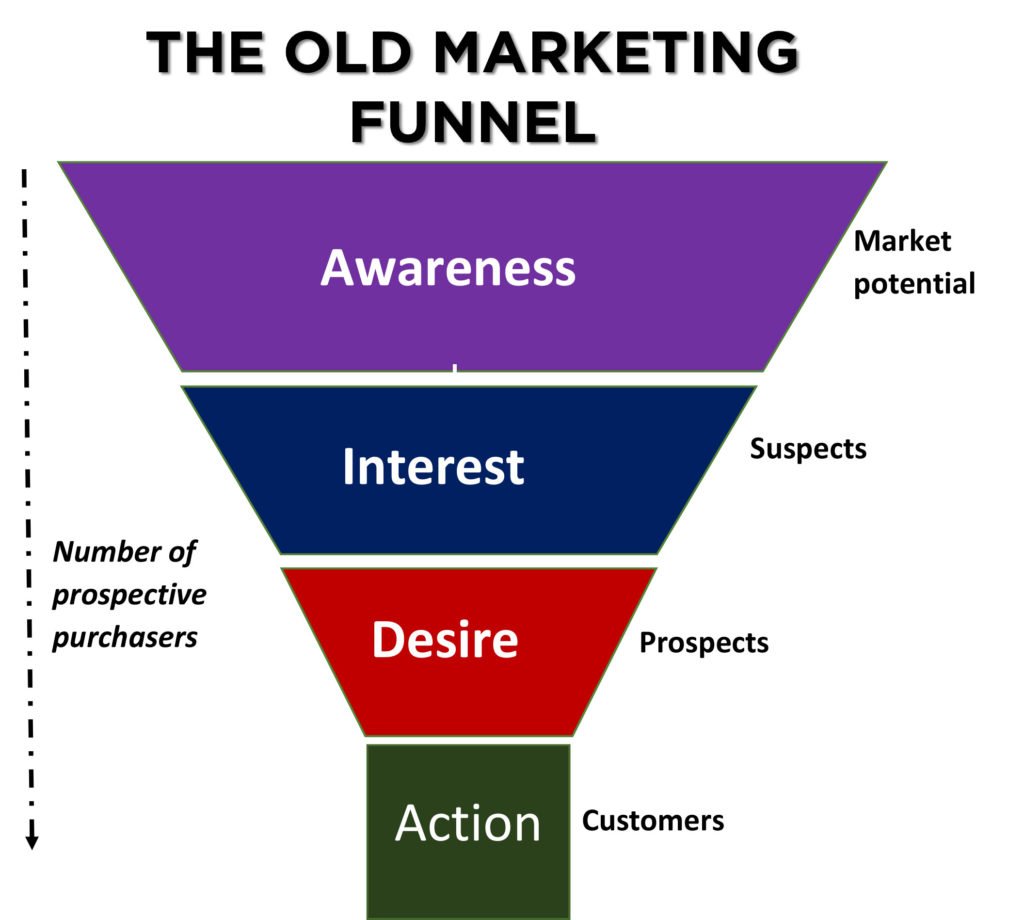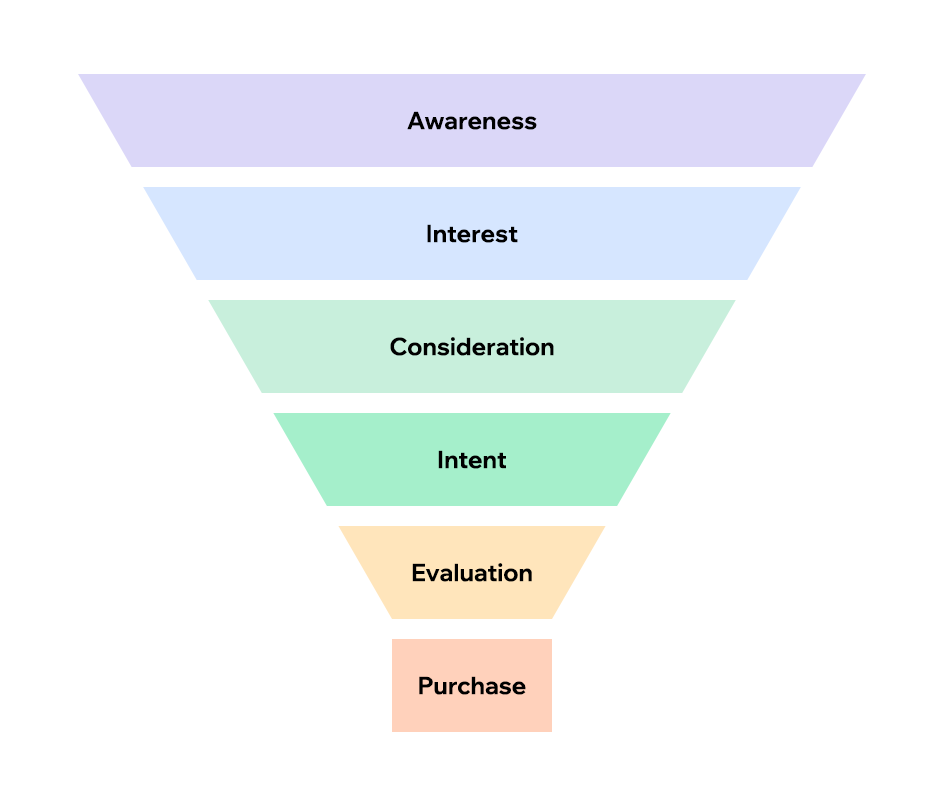Have you ever wondered how to market your products and serve customers on their shopping journey. A marketing funnel is a road map for serving clients at all stages of the buying process, from discovering your brand to making a purchase and beyond. Constructing a marketing funnel is beneficial for all kinds of businesses irrespective of its size and nature. It enables you to target the right audience, acquire qualified leads, nurture customer relationships and generate sales.
In this guide, we will cover all about marketing funnel. Continue reading to know what is a marketing funnel, learn different stages of marketing funnel and how to setup a funnel for your business.
Page Contents:
What is Marketing Funnel?
Marketing Funnel is a term that describes all the stages of customer-business interaction from building awareness to purchasing products and services. It is basically a tool created to push a specific set of audience towards purchasing the product or service.
It helps you structure your customers’ buying journey, address their concerns and assist them in the purchase of a product or service. It allows a brand to engage its visitors till the time the purchase decision is made.
Example of Marketing Funnel
Marketing Funnel is a buyer’s journey and is of the following types:
- Blog post>Email list>Conversion
- Podcast Ad>Blog post>Conversion
- Facebook Ad>Landing Page>Conversion
- Influencer Social Post>Landing Page>Conversion
Marketing Funnel stages
There are different approaches that depicts a customer’s journey when it comes to marketing funnel. Two of the most common marketing funnel models are:
Traditional Marketing Funnel
The AIDA model
As per AIDA model, a consumer typically goes through a series of different stages before buying a product or service. The four stages that AIDA model describes are:
Attention: Marketers use advertisements to make consumers aware of their products and services.
Interest: In this stage, a customer is inclined to make a purchase and show interest to learn more about the brand and its products.
Desire: This is the stage where a customer desires a particular product or service and goes from ‘I like it’ to ‘I want it’.
Action: This is the stage where the customer initiates action and purchases the product or service. The goal of every marketing campaign is to make customers reach the Action stage and complete the purchase.
Modern Marketing Funnel
Awareness: It is the first stage in which a prospective customer starts to become aware of your business through different advertising campaigns.
Interest: This is the stage where the customer explores and learns more about the brand, products and services, via mediums such as newsletters, emails, brochures, etc.
Consideration: Here, leads are converted into customers. At this stage, the business focuses on building client engagement and sending product or service information to the target customers.
Intent: An intent is created from the buyer’s end towards your product. The seller explains to the user how their product would be the best choice for the buyer.
Evaluation: At this stage, the buyer decides whether to make a purchase or not. The goal of marketers here is to convince customers that their company’s product is useful for the buyers.
Purchase: This is where a prospect makes a transaction and purchases the product or service.
Role of Marketing Funnel
An effective marketing funnel helps you streamline your business objective and achieve better results. Some of the major benefits of a marketing funnel are:
- Nurturing customers at every stage of their buying journey
- Building valuable customer relationships
- Encourage repeated purchases
- Maximize marketing efforts
- Drive sales and increase business revenue
- Speed up the marketing sales process
How to create a Marketing Funnel?
Gather consumer insights
As per a survey conducted by Marketo Engagement Gap, 56% of consumers want businesses to focus on content that meets their needs and resolves their problems. Marketers run several advertising campaigns without fully understanding customer’s requirements and needs.
There is a disconnect between client expectations and service quality. Hence, before creating a marketing funnel, it is crucial to analyze your target customers’ expectations and requirements. Conducting market research, audience feedback, and evaluating current customer statistics can help you provide a great user experience.
Create enticing Ad campaigns
The next step is to create an appealing ad campaign focused on the specific target audience. The format can include social media ads, blog posts, guest posts, videos, etc. Segmenting the audience is crucial to creating a successful and profitable marketing campaign. An ad campaign targeting 100 users is more effective than the same ad reaching 1000 people without focused targeting.
Set up a landing page
A landing page is a place where your potential customer will reach if they click on your ad. It is an important element of a marketing funnel strategy as it provides information related to your products and services. An effective landing page can help you build trust, establish authority and reduce bounce rate.
Create and set up email automation
A marketing funnel is incomplete without an email automation setup. It is important to nurture your leads throughout the different phases of buyers’ journey. You need to send specific emails that will automatically reach your potential client at every stage of the journey. You should continue giving value to clients through email content and send them emails at regular intervals to persuade them to make a purchase.
Testing
Testing is crucial to determine the effectiveness of the funnel. The marketing funnel setup does not end with a purchase. You also need to analyze data, gather customer feedback, and test different funnels to find which one is cost-effective and profitable. Evaluate metrics such as how many people clicked the email link, how many of them visited the landing page, and how many of them made a purchase. Analyzing these metrics will give you an accurate result of the success of your campaign.
Although creating a marketing funnel may appear to be a difficult task, it is incredibly beneficial in increasing conversion rates and generating visitors to your website. They help in the growth and development of a brand, as well as the acquisition of new leads and the retention of existing clients.
Using a marketing funnel, you can guide your audience throughout the different phases of the buyers’ journey and encourage them to make a purchase. Begin with minor steps and focus on constructing a simple funnel, then progress to more complex stages.

